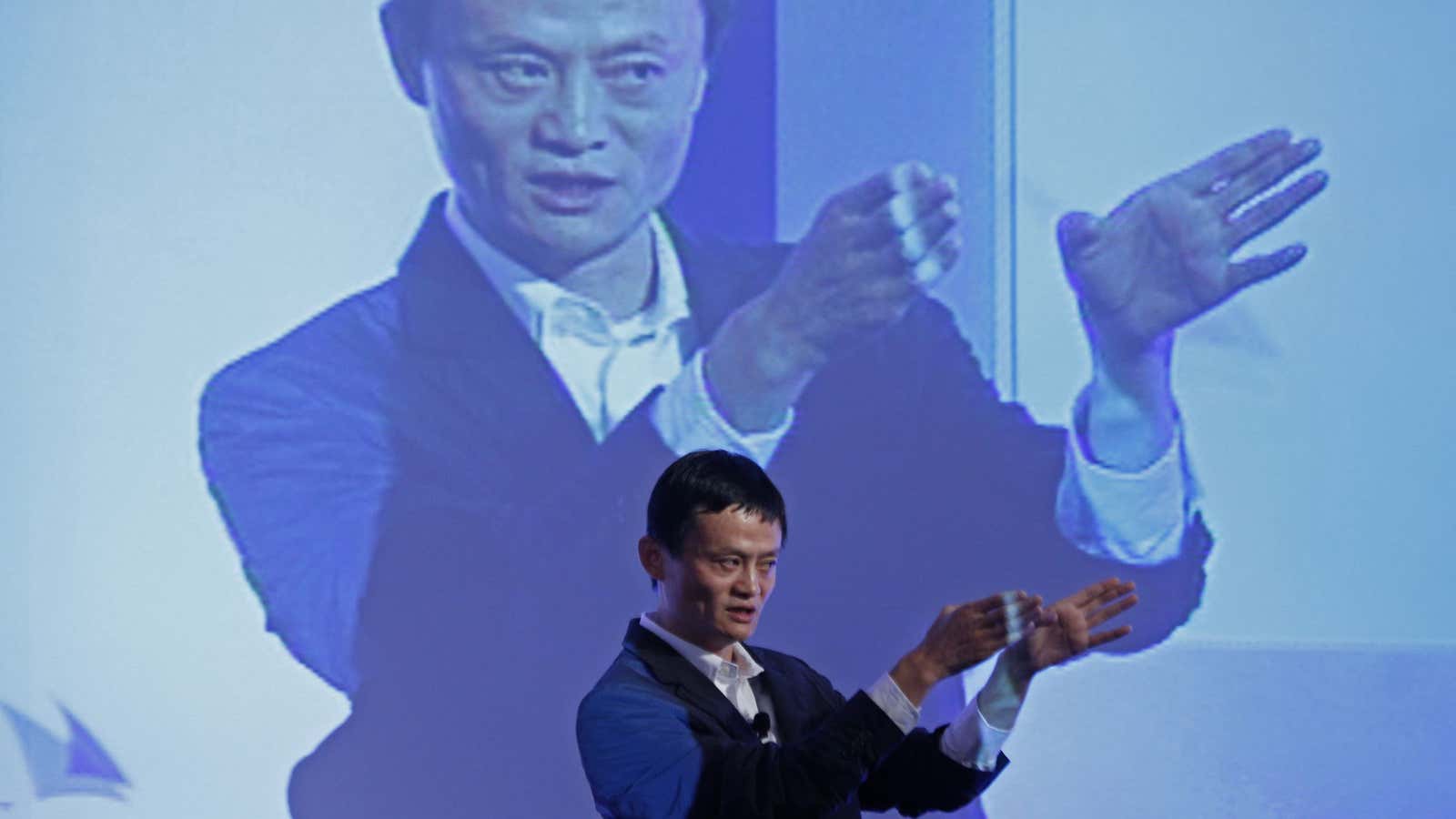One of the major questions investors will have in the upcoming IPO of Alibaba, the Chinese digital company that by some measures is the world’s biggest e-commerce company, is about its corporate governance.
Controversy and mystery still surrounds how Jack Ma, Alibaba’s founder and now board chairman, spun off Alipay, the company’s payment platform. Alibaba’s amended version of its IPO prospectus, just filed with the US securities regulator, offered a few more clues about the relationship.
First, the rather Byzantine backstory:
- 2004: In order to encourage buyers on its e-commerce marketplace to trust third-party sellers, Alibaba created Alipay, an online payment platform that holds the payment in escrow until the buyer has received and is satisfied with the purchase. This idea worked, and helped foster Alibaba’s breakneck e-commerce growth. To this day, Alipay is central to Alibaba’s growth, with 78.3% of Alibaba’s retail transactions routed through the service.
- 2005: Shortly thereafter, Yahoo took a 40% stake in Alibaba Group. The Japanese internet giant SoftBank bought around 37%. Both have seats on its board.
- 2010: The People’s Bank of China issued new rules (link in Chinese) governing third-party online payment companies, stipulating that they must apply for and receive licenses from the PBoC in order to operate—and that they had to do so by September of 2011. Notably, while the announcement placed no direct restrictions on foreign-funded payment platforms, it said that they would be governed by separate regulations issued by the PBoC.
- Early 2011: Ma spun off Alipay under another company, granting himself a 46% stake in Alipay.
- May 2011: Yahoo disclosed to its shareholders that Alibaba had spun off Alipay to comply with the rules, causing its shares to drop 12%—and that Jack Ma, founder and then CEO of Alibaba, had only informed Yahoo about the spinoff five weeks after it had happened. Though Jack Ma defended its choice, the PBoC had still not issued separate regulations it had promised governing foreign-funded payment platforms.
- May 2014: Alibaba filed with the US regulator for an IPO. The first draft of the prospectus argues that this spinoff was ”pursuant to regulations issued by the PBOC.” However, in an oddly worded sentence, it also seems to acknowledge that those regulations never materialized, saying, “At the time when the licenses were first issued, no such additional regulations governing foreign-owned payment companies had been put in place.”
- June 2014: Alibaba filed an updated prospectus, tweaking some of the language concerning Alipay. The PBoC still hasn’t issued any separate regulations governing foreign-funded payment platforms.
A lot of confusion continues to linger around both Alibaba and Alipay’s relationship, and whether an Alipay IPO might benefit Alibaba financially. Here’s the information that Alibaba added in its updated prospectus:
- Clearing up the relationship: In its summary, Alibaba had previously referred to Alipay as its “related company.” Changes to the original prospectus highlight that Alibaba no longer has “an ownership interest in or control over Alipay or its current parent company.”
- Jack Ma personally still has the biggest stake: Alibaba says Jack Ma still holds 46% of Alipay’s parent company, the Small and Micro Financial Services Company (SMFSC).
- Ma also controls a company with a large stake: Another 42% is held by a group called Hangzhou Junao Equity Investment Partnership, known as Junao. It adds that an entity controlled by Ma is Junao’s general partner, giving him the ability to exercise voting power over Junao (and, by implication, over Alipay’s parent company, SMFSC). For what it’s worth, the original prospectus made no mention at all of Junao.
- More details on Ma’s divestment in Alipay: Jack Ma says he will reduce his direct and indirect economic interest in SMFSC to a percentage that doesn’t “exceed his and his affiliates’ interest” in Alibaba by the time Alibaba completes its IPO—something the original prospectus indicated more vaguely—and in a way that generates no economic benefit for Ma or his affiliates.
- Alipay will IPO in China: The changes also indicate that Alipay’s parent company, the SMFSC, will raise equity funding from “unaffiliated domestic Chinese investors” in order to finance its expansion. If that equity capital is to be raised publicly, Ma and his affiliates have no real choice but to list it in China—despite its lousy stock market performance—given that they continue to argue the spinoff was necessary to remove foreign capital from the ownership structure.
- Lakeside Partners seem closely knit with Alipay: Alibaba’s other big corporate governance controversy involves the Lakeside Partners management council (more on that story here), which will have exclusive right to nominate most of Alibaba’s board of directors post-IPO. This latest prospectus finally reveals who they are. And it turns out six members work for Alipay’s parent company, SMFSC, out of 27 total members. Two, Simon Hu and Lucy Peng are also Alibaba managers.
- Alipay is still central to Alibaba: In fiscal year 2014 (March 2013-March 2014), 78.3% of Alibaba’s retail marketplace gross merchandise volume (GMV) was settled through Alipay, changed from the 78.6% for all of 2013 in the first prospectus.
- The relationship is a little lopsided: For the fiscal year 2014, 33.9% of Alipay’s total payment volume came from payments processed for Alibaba’s China retail marketplaces, compared with 37.6% for all of 2013.
